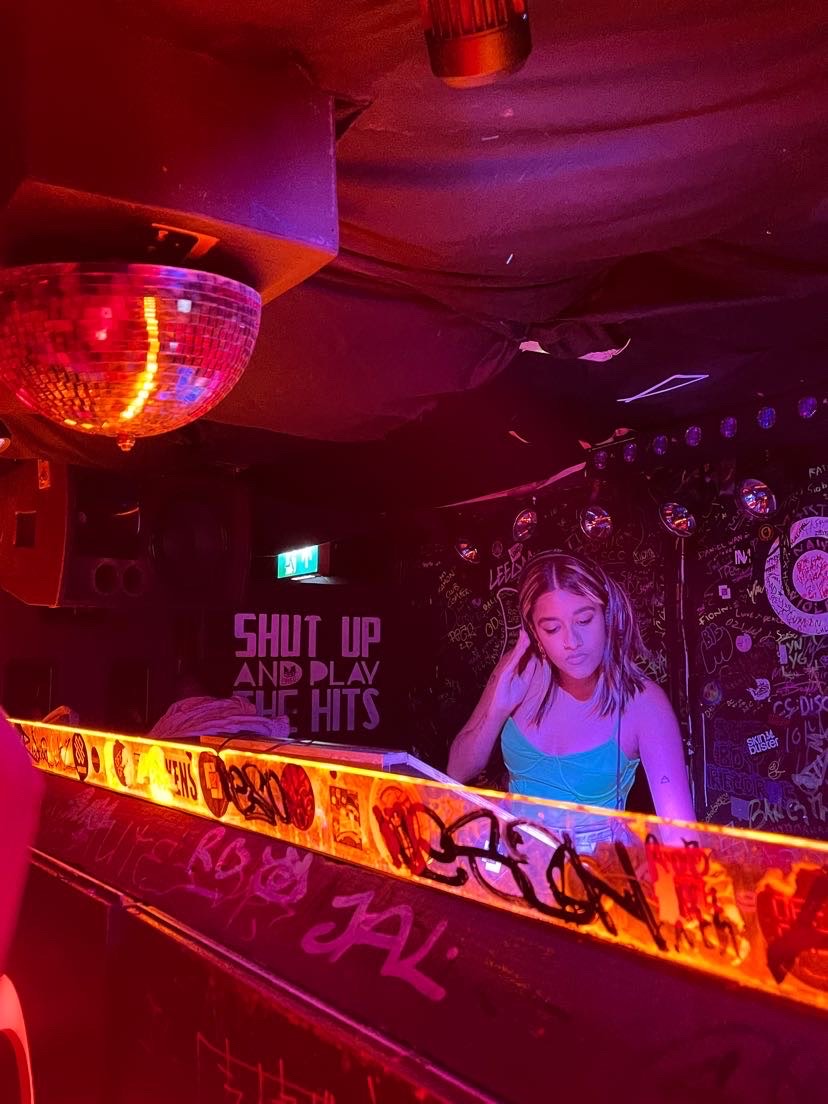As we look forward to a dynamic change in Dublin nightlife, it’s important to recognise those who have been trying to keep this culture alive over the past few years. Bringing new tracks and sounds into everyone’s night out, DJs are an integral part of the club. Catherine and I decided to chat to two members of DUDJ to find out more about their experiences in the scene in Dublin, and what it takes to be a DJ.
“People say I’ve had it really easy, but no, I’ve worked really, really hard.”
Sahana Sridharr, PRO for DUDJ confesses to me over the rumble of people in the Arts Block. Sridharr mentions this in reference to her fast rise into the Irish DJ scene. In her past year in DUDJ, Sridharr has graduated from hosting Trinity Events and mixers, to performing at Electric Picnic and hosting her own show on Dublin Digital Radio. Arriving in Dublin as a first year, she started off in DUDJ with basic knowledge of how to operate the decks, and has since then made a name for herself in the Dublin scene. Ashling O’Connor, OCM for DUDJ, shares a similar journey. O’Connor is one of the members of the group Puzzy Wrangler, known for breaking onto the Dublin scene with their funky mixes and crowd-pleasers. In explaining the group’s success, an important factor for O’Connor has been the unlimited practice time which they have been able to avail of in the DUDJ practice room.
O’Connor admits that DJing “can be extremely intimidating and quite inaccessible,” and that individuals looking to get involved need to “overcome the fears in your head. It’s not really something that you can get into if you aren’t somewhat invested because you have to be constantly on it — it’s a very proactive hobby.” In terms of tangible steps that individuals can take, O’Connor’s advice is to “text DUDJ about the practice room and come to tutorials. It’s all about persistence and practice makes perfect so you really have to want it.” In efforts to inspire others to overcome the intimidating and inaccessible aspects of DJing, the two decided to hold DUDJ’s first tutorial for female and non-binary identifying students.
The turnout was one of the highest either of the members had seen for a tutorial. Myself and Cat tried to learn the basics; while the actual practise of DJing requires a lot of effort and knowledge, the environment we found ourselves in was incredibly welcoming and educative, and raised hopes of changing the demographics of the industry in Dublin.
As Sridharr notes, DUDJ is reflective of the DJ scene in Dublin: it’s dominated by white Irish men. While the demographics for DJs are slowly changing, Sridharr wants to speed up the process; especially within DUDJ. Their first tutorial for female and non-binary identifying students was an unexpected success and raised hopes that there could be more diversity and inclusion within the society. Sridharr strongly advocates for this change to happen, and invites anyone who is underrepresented in the industry to come to tutorials and run for positions on committee
“We definitely need more women, more people of colour, more gender minorities — I want that to be the headline.”
Sridharr also explains this in reference to club safety. Audience demographics tend to differ enormously depending on the performer, “when there’s a man playing, it’s mostly men who show up”. Female and queer-led events and club nights tend to foster a more safe space, and have a more inclusive environment.
In fact, this was a feeling that was shared by myself and Catherine when we took part in the tutorial. Being in a space that felt free of judgement allowed us to get rid of the fears in our head, and I have the feeling that it also lit a spark in many of those attending. Many present at the tutorial seemed more than eager to take their shot at mixing tracks, and worries about judgement and capabilities seemed a distant thought. At the end of the day, DJing is about having a good time playing mixes. This form of tutorial more than encouraged this.
Both Sridharr and O’Connor have found that their experiences as female DJs have been more than positive. “People are really gagging to have women behind the decks,” says O’Connor. Sridharr also adds that she feels she has also received numerous opportunities at only the beginning of her career. This has, at times, made the two question whether it is just a matter of “ticking the boxes” for diversity, or whether such enthusiasm is well-deserved. However, Sridharr is completely against this mentality, citing both of the members’ hard work and passion when it comes to the subject “I’ve worked really, really hard, and it shows.”
Having spoken to both Sridharr and O’Connor, the picture they paint of the industry in Dublin is that most people are supportive and want to see others succeed. However, there are those who may be intimidated by the success of others, specifically women. This unresolved toxic mentality has been lingering over the scene for a while, and should be addressed. However, this doesn’t matter too much to performers: the successful female DJs out there know they’ve got the right stuff, and are very good at it. Sridharr’s and O’Connor’s hope is that they can help more people realise they, too, can be behind the decks, and at that point, the opinions of others won’t matter.
DJing takes time and patience, but having access and an encouraging environment can certainly inspire many who had previously thought it to be too complex or intimidating. Sridharr and O’Connor have shown that talent and dedicated practice can take you a long way, all it takes to start is a willingness to learn and a DJ deck.






